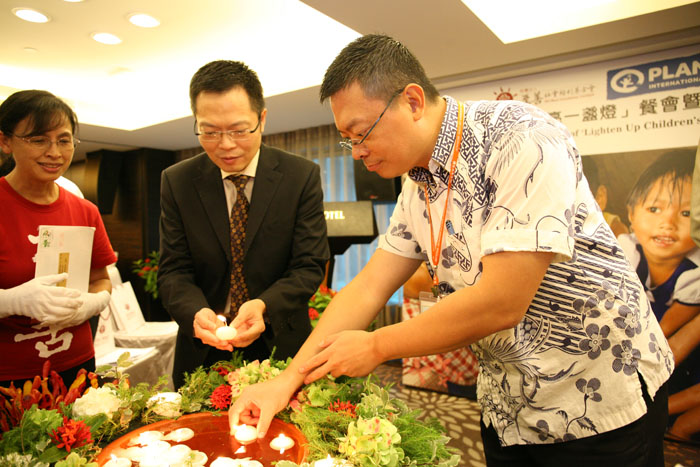Hand in Hand to Lighten Up the Future of Children in Myanmar--Cross-border Collaboration among NGOs and Private Sector
2016-09-13
Due to the financial difficulties faced by the government, and various factors, including poor sanitation and health, poverty and lack of clean water result in the Myanmar’s falling behind in social development. Therefore, Zhi-shan and Plan International jointly initiated the Early Childhood Care and Development (ECCD) Project in Nyaung-U Township, Mandalay Region, supporting 600 children aged from 0 to 8 years old and conducting parenting education to 300 caregivers to improve the health, nutrition, social and emotion development, safety and protection of children.
Representatives from Plan International Japan and Myanmar, Ministry of Foreign Affairs, Association of East Asian Relations and Interchange Association (Japan) Taipei Office, as well as from private sector, including San Yang Metal Industrial Company, Pou Chen Group and United Safety Medical Group gathered together today at a ceremony organized by Zhi-shan Foundation to give blessing to children in Myanmar by practicing the traditional ritual of candle lighting, wishing that public, private and voluntary sectors can collaborate and support the early childhood care and development, children in Myanmar can grow up health and happy.

George Yen, President of San Yang Metal Industrial Company, is the first businessman who responds to the call. ‘The reasons why I commit to the corporate giving can be broken into 3 parts: Why, Who and What. Firstly, the ‘Why’ is a matter of personal value. I believe in the idea of ‘nobility obliges’. Secondly, the ‘Who’ obviously refers to ‘Zhi-San Foundation Taiwan, which I have been involved in for about 15 years and therefore know intimately of their results of work in Taiwan, Yunnan and Vietnam. Thirdly, the ‘What’ has several appeals. Taiwan, as an orphan in terms of international politics, through collaboration with NGOs with long overseas experience, corporate sector can build bridges and connect with the rest of the world.’ George said. ‘I sincerely believe that Early Childhood Care and Development Project in Myanmar is an area where we can make a difference and have long term impact.’ He added.
Jenny Swe Swe Myint, Programme Director of Plan International Myanmar, made a brief introduction about the current social, economic and political development in Myanmar. In Myanmar, poverty levels are at an estimated 26% of the population, and poverty is twice as high in rural areas where 70% of the population lives. Moreover, there are various long-lasting ethnic conflicts between the government and ethnic minority, causing more than 600,000 internal displaced people, within which children are the most vulnerable and affected groups.
Plan International Myanmar signed MOU with the Department of Social Welfare to jointly implement various development projects, including improvement of the maternal, natal and children’s health and nutrition, early childhood care and development, water, sanitation and hygiene, child protection, disaster risk reduction. The results of work are recognized by the government. Jay Hung, CEO of Zhi-shan Foundation Taiwan, appeals to the government and private sectors in Taiwan to rethink their strategies New Southbound Policy initiated by President Tsai. It is important for Taiwanese enterprises to gain in-depth understanding of Myanmar, as well as to collaborate NGOs as a means to deepening the brand value and objectives of the companies and realizing corporate social responsibility to make our world a better place.

Kazuo Tsurumi, National Director and Executive Managing Director of Plan International Japan, analyzed the global trends of CSR from the UN Sustainable Development Goals (SDGs) and said: ‘no single sector can solve the current social issues. To build partnership between and identify shared values among business and NGOs is very significant. With the efforts of government, the business sector can contribute their know-how to resolve the social problems and move toward more stable development.’ He also encourages the corporate sector to incorporate SDGs into their business development strategies and rethink how to provide services to the ‘Bottom of the Pyramid (BoP)’. Through creating social values, the business is also creating their competitive advantage.
